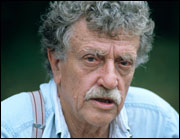Historical inspirations
UU World asked: What historical Unitarian, Universalist, or UU most speaks to you?
Sally Carroll, of the Unitarian Universalist Church of Fresno, California, named Lucy Stone as one of her “feminist heroes.” “She was one of the earliest champions of women’s rights, at a time when ‘ladies’ did not speak in public. She convened the first national women’s group that led to the suffrage movement. And she kept her maiden name (like I did).”
Amy Lawton, of First Unitarian Church of Orlando, Florida, is most inspired by Kurt Vonnegut. “An atheist/agnostic, Vonnegut was comfortable talking about God, as anyone who has read Slaughterhouse-Five knows. In that book, Vonnegut puts forth the notion that Jesus wasn’t the son of God until he was on the cross. I love that idea, because it turns away from a narrative of cosmic child abuse. Perhaps God chose a son because Jesus was suffering, not so that Jesus would suffer. It is an encouraging thought.”
Hosea Ballou speaks to Doug Muder, of First Parish in Bedford, Massachusetts. “To me, he was the first person to truly take seriously the idea of a loving God. Naturally, I don’t completely agree with him 200 years later, but when I read his work I’m always struck by the beauty of his vision.”
Kat Liu, of All Souls Church, Unitarian in Washington, D.C., wrote: “I know it’s cliché, and I hate how classist all the Transcendentalists were, but honestly, Ralph Waldo Emerson speaks to me the most. Because he took Hindu theology and translated it into Christian language and thereby transformed Unitarianism. It’s because of Emerson that I am a UU.”
Other readers named: Olympia Brown, Beatrix Potter, Moncure Conway, Henry David Thoreau, Ted Sorensen, Antoinette Louisa Brown, Celia C. Burleigh, Edward Everett, Laura M. Towne, and Charles H. Brigham.
For the next issue: What did you find most compelling, inspiring, or provocative about this year's Justice General Assembly in Phoenix? Send your answer to world@uua.org.
Comments powered by Disqus







